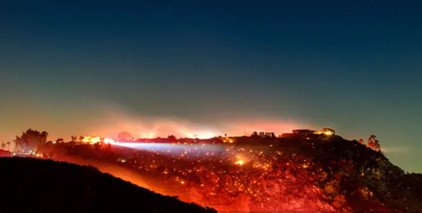

Inferno in California: The 2025 Wildfires and the Fight for Survival
In early January 2025,
California faced a series of devastating wildfires, particularly in the Greater
Los Angeles area. The most significant of these was the Palisades Fire, which
ignited in Pacific Palisades and parts of Malibu, consuming nearly 24,000
acres. This fire led to the destruction of over 6,380 structures and resulted
in eleven confirmed fatalities and four injuries.
Another major
incident, the Eaton Fire, burned approximately 14,021 acres in Altadena and
Pasadena. This fire destroyed at least 9,416 structures, making it the second
most destructive fire in California's history, and caused seventeen confirmed
fatalities and seven injuries.
As of January 22,
2025, the California Department of Forestry and Fire Protection (CAL FIRE)
reported a total of 227 wildfires statewide, burning approximately 40,687
acres. These fires have resulted in 28 fatalities and the destruction of 15,798
structures.
The severity of the
2025 wildfires has been attributed to exceptionally dry conditions and strong
Santa Ana winds, which have exacerbated fire spread and hindered containment
efforts. Climate scientists have noted that climate change has increased the likelihood
of such events by creating periods of heavy rainfall, leading to increased
vegetation growth, followed by severe droughts that dry out the vegetation,
making it more susceptible to fires.
In response to the
crisis, Los Angeles Mayor Karen Bass issued an executive order to expedite
cleanup and prepare for potential rain, which could cause mud and debris flows
in the aftermath of the fires. Preventive measures include shoring up hillsides
and reinforcing roads to mitigate further damage. On January 30th, A benefit concert, "FireAid," was organized featuring artists like Stevie Wonder, Billie Eilish, and Lady Gaga, to raise funds for wildfire relief efforts.
The 2025 California
wildfires have had a profound impact on communities, resulting in loss of life,
destruction of property, and significant cultural losses, including the
incineration of art pieces and historical landmarks. The path to recovery is
expected to be long and challenging, with efforts focused on supporting
affected residents and rebuilding devastated areas.


